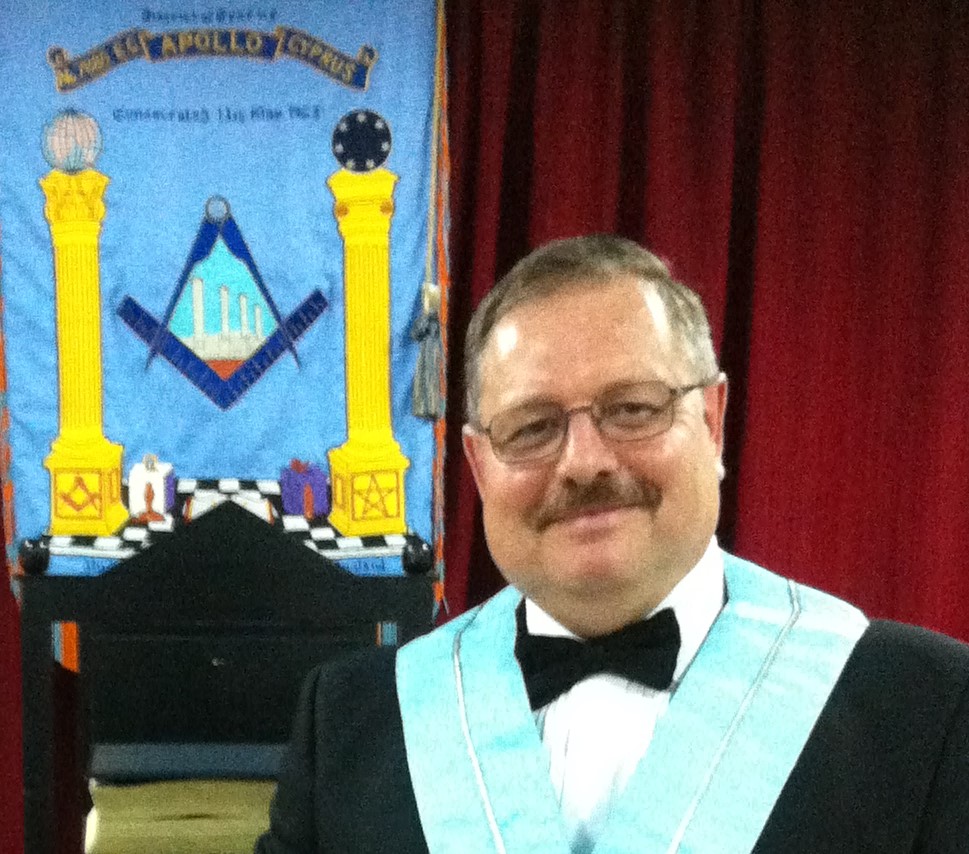Provincial News
- Written by: Michael Genner
On Tuesday November 22nd, most of the Provincial Team turned out at Sheaf Close to support our Provincial Grand Master conduct the ceremony of rededicating the banner of Coritani Lodge 8079 as part of their 50th anniversary celebrations. Over 110 brethren attended.
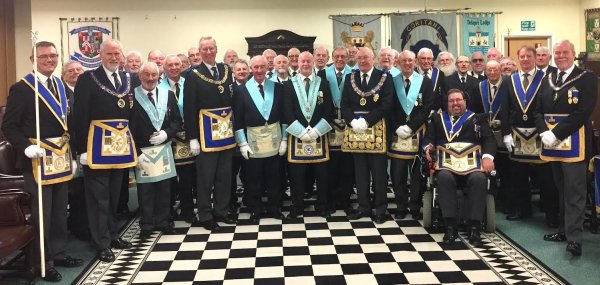
Coritani Lodge was consecrated on May 3rd 1966 and 6 years before they designed and sourced a banner that was formally dedicated at the Wheatsheaf Hotel Daventry, on October 26th 1972, by RWBro Richard Palmer the PGM at that time.
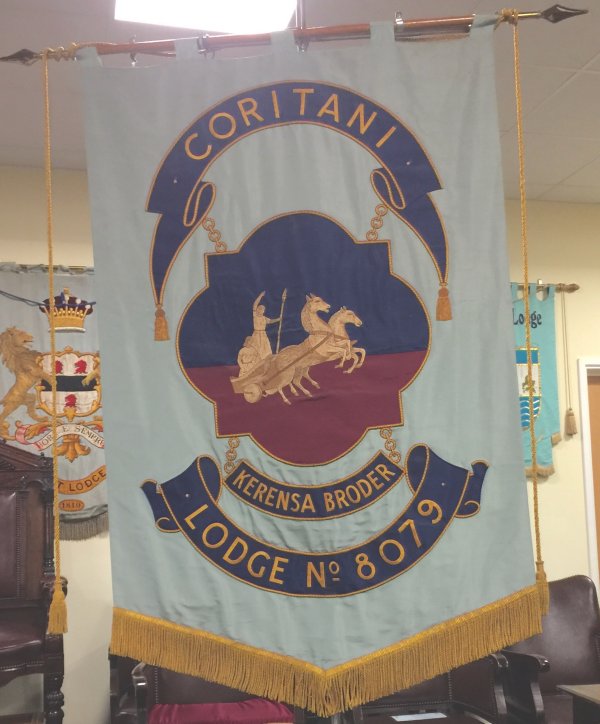
The Image on the banner portrays Boudicca in her chariot whilst the Motto, ‘KERENSA BRODER’ translates as ‘Brotherly Love’
Coritani’s mother lodge, Beneventa 2380 was named after the early Roman settlement of Bannaventa, situated at the North end of Borough Hill on the outskirts of Daventry, which ultimately became the present day village of Norton. In his dedication address, the Provincial Grand Chaplain, WBro Rev’d John Simmons, explained the design of Coritani’s banner which reflects the thought processes followed when the name ‘Coritani’ was chosen.
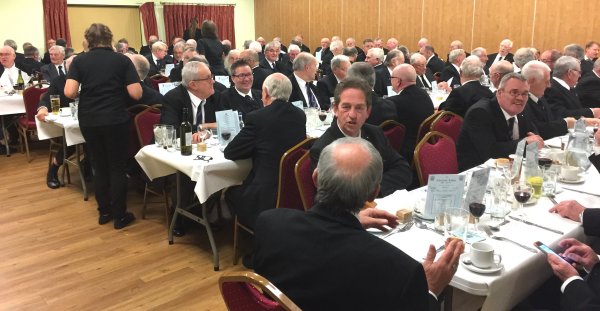
The Festive Board was well attended
Additional Historic Information
The ‘territory’ of the Celtic tribe of ICENI, one of the 35 British tribes known to have existed in the Iron Age period, stretched along the east coast from the town of Stour in Essex to the Humber in Yorkshire. The Iceni tribe was divided into two clans, the northern called ICENI CORITANI (Corieltauvi) and the southern ICENI CENOMANNI, divided more or less by the river NEN.
Of the former tribe, BANNAVENTA was the frontier city, covering it’s territories to the west, bordering on the DOBUNI of Oxfordshire and the CAENGI, foresters of Warwickshire.
Celtic people were deeply religious, worshipping many gods – the name Coritani actually meant ‘worshippers of the ‘effective’ deity’ – and to express their devotion to their gods, the Celts made regular offerings by placing items in rivers, deep pools and sacred groves and during times of great hardship they often deposited large numbers of precious objects, such as gold torcs (necklaces) and large earthenware vessels filled with coins, in deep pits in the ground. The Iceni had been minting coins from about 50 BCE, until the Roman conquest in 43 AD. These were usually silver coins with a patterned face on one side (obverse), with a horse on the reverse.
The ‘Celts’ were a warlike race of people who dominated Europe for 500 years. From 800 BCE Celtic civilization spread rapidly through mainland Europe, reaching the British Isles in around 500 BCE. By 400 BCE the Celts had become the most powerful people in Europe – an invading Celtic force of Senones led by Brennus very nearly succeeding in conquering Rome and after the Romans surrendered, the Celtic chieftains demanded a hefty ransom before agreeing to leave. Following this humiliating and embarrassing defeat, Rome’s hierarchy wanted revenge, realizing that the Celts now posed a constant threat to their civilization they immediately launched a military offensive, whose long term sole objective was to crush and subjugate the Celts.
In AD 43 the Roman emperor Claudius invaded Britain and while most of the British tribes in southern England, surrendered to the Romans without a fight, Caratacus, the Catuvellauni king, continued to fight and in 47 AD the Iceni rose in revolt after the Romans tried to enforce a law forbidding the carrying of weapons. The revolt was put down and Prasagustas established as a client king.
Prasutagas decided that it would be prudent to make his will assigning half of his personal property to the Roman emperor but when he died in 61 AD the Roman officials decided to interpret his will as a submission to the Roman state and moved to appropriate all of the Iceni lands and disarm the tribe.
Not surprisingly, Prasutagas's widow, Boudicca (or Boadicea as she was sometimes known) protested. The Romans had her publicly flogged and her two daughters were raped. In 61 AD Boudicca raised the Iceni and the neighbouring Trinivantes tribe in revolt against Roman rule and it was only with some difficulty that the Romans managed to quell the Iceni uprising, with Boudicca choosing to take her own life rather than fall into the hands of her enemies. The Romans established a new capital in the Iceni lands at Caistor, near Norwich and no record of the Iceni exists after this point, though legends suggest that large numbers fled west into Wales and eventually settled in Ireland.
On Saturday the 19th November 2016, Bro Benjamin Turvey was initiated into Abington Lodge No. 8041. The meeting was held at the Masonic Centre, Sheaf Close, Northampton.
Bro Ben is the stepson of WBro Selwyn Griffiths; he is also the stepbrother of Bro Jonathan Griffiths.
Performing in his capacity of Junior Deacon, Bro Jonathan conducted Bro Ben around the Lodge during the ceremony. The Master of the Lodge, WBro John Harris, invited WBro Selwyn to take the Master's chair up-to and including the obligation of his stepson.
It was a most enjoyable evening for everyone present, especially the very proud Griffiths family!
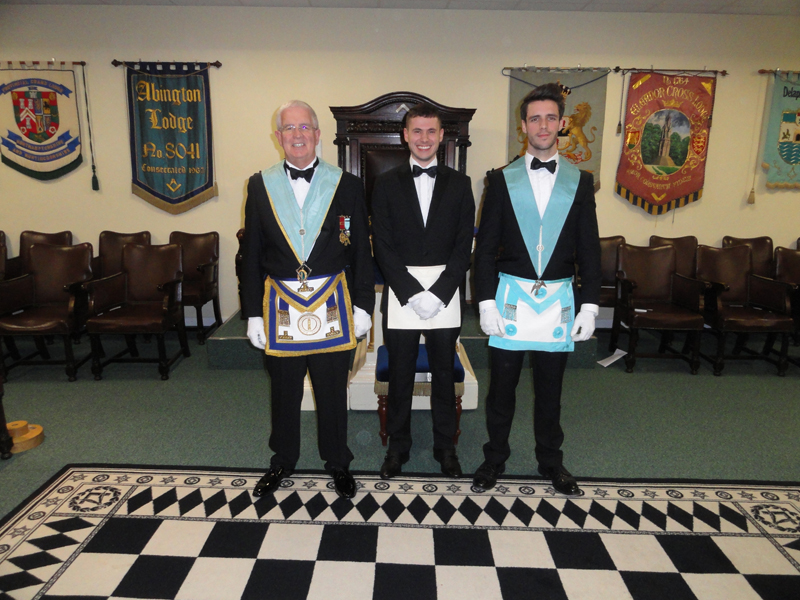
From left to right, WBro Selwyn Griffiths PPJGW, Bro Ben Turvey and Bro Jonathan Griffiths
- Written by: Simon Key
It is with great sadness that we announce the passing of W.Bro John Witts PPSGW to the Grand Lodge above.
WBro John was initiated into Delapre Lodge on 15 January 1965, became Master in 1972, and served the lodge as organist since leaving the Chair of KS.
He was extremely well known among Northampton Masons being either the organist or honorary organist of Delapre Lodge, Pomfret Lodge, Kingsley Lodge, Lodge of St George, Anglo Scottish Lodge, Lodge of Harmony and Towcestrian Lodge. He was also organist of three Northampton Chapters as well as a number of Mark lodges.
WBro John was Provincial Grand Organist from 1978 to 1987. He rose through the ranks of Provincial Grand Lodge, culminating in the rank of Past Provincial Senior Grand Warden. He was honoured with the Provincial Grand Master's Certificate of Merit in 2010.
WBro John's funeral will take place at 11am on Tuesday 6 December, 2016 at St Andrews Church, Harlestone Village, Northampton NN7 4EN and afterwards at Sheaf Close from 12.30pm to 1.00pm.
He will be sadly missed by all who knew him.
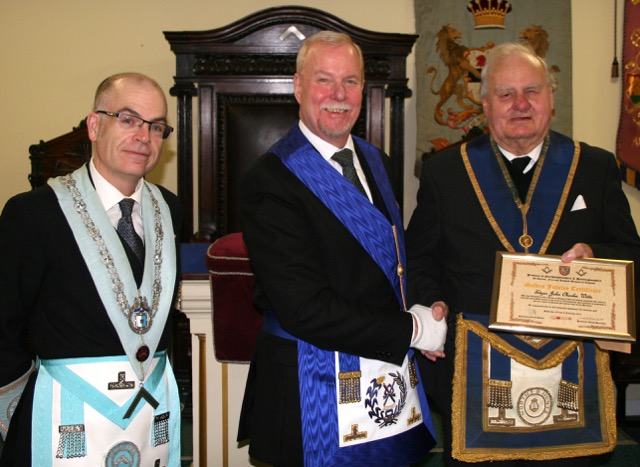
WBro John Witts PPSGW receiving his 50-year Jubilee certificate from WBro Charles Bennett in 2015
- Written by: Simon Key
We are pleased to confirm the appointment of a new Local Communications Officer, W. Bro Nigel Dickens of Kingsley Lodge 2431. Nigel replaces W Bro Tony Potter who has retired from the role after many years of distinguished service. Nigel will work with the other Northampton Communications Officer, WBro Andy Moore, to facilitate communications to/from the Northampton Lodges.
W. Bro Nigel Dickens of Kingsley Lodge 2431
Nigel was initiated into Apollo Lodge 7886(EC) in the District of Cyprus in October 1988 while serving in the RAF, but because of his posting back to the UK in 1990 and the arrival of his first daughter, his progression in Freemasonry paused for a time.
However, on leaving the RAF in 2002 and settling back in Northampton, he became a joining member of Kingsley Lodge, working his way through the ranks to become Master in 2011. He is currently Lodge Mentor.
Nigel was Exalted into Kingsley Chapter in 2007 and is presently 2nd Principal. He is also a member of Northampton Castle Mark and Victory Preceptory No 207 Knights Templar and is currently the Deputy Commander of the Provincial Priors Bodyguard.
Nigel married his wife Helen in 1979 and they have two grown up daughters. Since leaving the RAF, he has been working as an IT and Information Security specialist and is currently a Cyber Security Consultant.
We are very pleased to welcome Nigel to our Provincial Communications Team.

